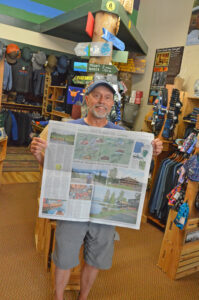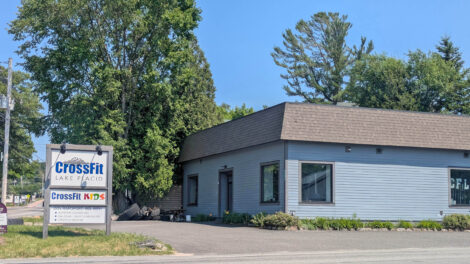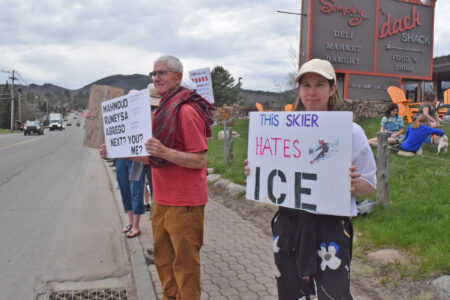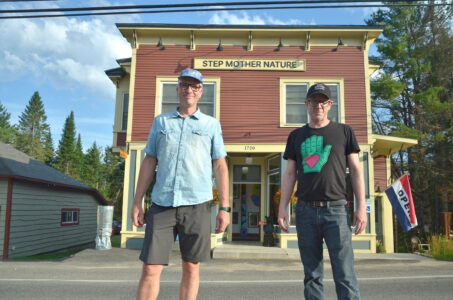Consultants: Lake Placid has a housing ‘affordability gap’

Dean Dietrich, chairman of the Lake Placid-North Elba Community Development Commission, speaks to an audience in the Lake Placid Middle-High School auditorium Wednesday. (Enterprise photo — Elizabeth Izzo)
LAKE PLACID — Consultants stood before a crowd of locals Wednesday and outlined what three months of research had made clear to them: Lake Placid is facing a workforce housing crisis.
Representatives of Camoin 310, a Saratoga-based consulting firm contracted by the Lake Placid-North Elba Community Development Commission’s Joint Community Housing Committee to study Lake Placid’s housing needs, presented the results of its study at a community meeting in the Lake Placid Middle-High School auditorium Wednesday.
The study, which features a wealth of data on things like population trends, wages, housing values and prices, short-term rental impacts and housing availability, painted a clear picture of what Project Manager Daniel Stevens called Lake Placid’s growing “affordability gap.”
“There’s a misalignment of income levels and housing values in this area,” he said.
Beyond continuing to impact the lives of residents, according to Camoin 310 Vice President Rachel Selsky, this gap has the potential to stymie the local economy.
“Affordable and workforce housing really is an economic development issue,” she said. “As workers can’t find housing, employers can’t find workers, then they have to make really tough decisions.
“Being able to have places for workers to live is critical to all of your businesses in town, and it’s critical to remaining a place where businesses want to be.”
—
‘Affordability gap’
—
As an area fueled by tourism, many of the most common job positions here are related to retail, trade services, restaurants and bars. Five of the six most common jobs have a median income of less than $30,000 per year, the study shows.
Meanwhile, the accommodations that would most commonly serve this income range — apartments — are increasingly being converted into short-term vacation rentals.
There are 427 apartments in North Elba considered “affordable” for that income bracket, with rents between $879 and $1,400 per month, according to the study.
As of Thursday, there were at least 697 active short-term vacation rentals with Lake Placid addresses, according to AirDNA, a website that aggregates data from Airbnb and HomeAway.
“There is very little inventory of what we could consider workforce, affordable housing,” said Stevens. “And there’s strong competition for those that are available.”
Apartments are being converted, in part, simply because landlords make more money by hosting visitors than long-term tenants, according to Stevens.
“It’s night and day between the revenue potentials of the two rentals,” he said.
According to the study, the average landlord offering a two-bedroom apartment for $1,250 per month will make $15,000 per year — while a short-term rental owner whose property is occupied just 37% of the time, at a rate of $271 per night, can rake in $36,599 per year.
A short-term rental offered up at $271 per night would have to be occupied just 56 days to make the same amount of revenue that a two-bedroom apartment generates in a year.
“There’s an unmet demand for a variety of housing types, but rental apartments in particular,” Stevens said. “That goes back to this issue about many of them being converted for use as short-term rentals.”
—
Housing stock
—
While apartments are being converted to short-term rentals, the housing stock in North Elba is increasingly being bought up by second homeowners and vacationers, while locals are being priced out.
Where in 2010 one in five local homes were considered seasonal or vacation homes, in 2017, one in three homes were for being used for that purpose.
This coincides with rising home values. The value of a single-family home in Lake Placid is 40% higher than the rest of Essex County, according to the study.
And to be able to afford the typical non-waterfront home, a local household with an income of $54,200 would need an additional $29,000 in income each year.
As this trend has continued, Lake Placid’s year-round population has been declining. Between 2009 and 2017, the village lost one out of every five of its families, the study says. And only one of three people working in Lake Placid live here, down from one out of two people in recent years.
The Lake Placid Central School District has also been impacted. Though there was a slight five-student bump in enrollment between 2016 and 2017, smaller enrollment each year has been a trend in this district since at least 2002. Only 24 students have entered the district in kindergarten this year. It has 39 lined up for next year in pre-kindergarten.
“Things are really starting to transition into a vacation community,” said Selsky. “You need to take action to address these challenges.”
—
Moving forward
—
The study says that with a target of 50% of the local workforce living within the community, North Elba and Lake Placid have a need for roughly 1,534 “workforce and affordable level” housing units — the majority, 1,013 units, for those who make less than $35,150 per year. In the study, affordable for that income range is defined as less than $879 per month for apartments, and under $123,000 for a home.
The study points to high land and construction costs, and few available sites for development, as real barriers to building new workforce housing.
Addressing the housing need won’t be easy, according to Selsky — it’s going to take forging partnerships with both public and private organizations, and could involve finding a way to provide some sort of incentive for landlords to offer apartments over short-term rentals.
“This is going to take some continued action,” she said. “There’s a lot of work still to be done.”
The study identifies three key goals moving forward: Increasing the availability of year-round workforce housing; assisting local residents with securing quality housing at “nonburdensome” prices; and increasing the capacity to address community housing needs, possibly by exploring the creation of a land bank, hiring a dedicated government employee to focus on community housing, or by creating a workforce housing fund to help support development efforts.
The full results of the study are now available online at futurelakeplacid.com.




